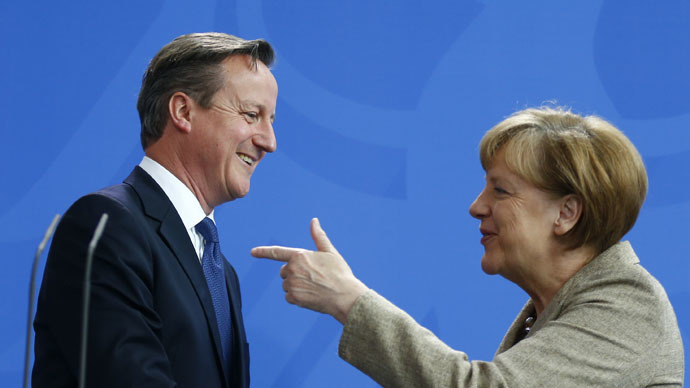Cameron ‘playing poker with his hands of cards facing upwards’

David Cameron has said he doesn’t want to leave the EU, so if he wants changes to the UK’s membership he needs to sort himself out from a negotiating skill perspective, British politician and former MEP Godfrey Bloom, told RT’s In the Now.
On Friday, Britain’s PM David Cameron traveled across Europe to set out terms for Britain to stay in the European Union. He wants changes to Britain's membership before holding a vote on whether or not to stay in the bloc, something which may be decided next spring. Cameron said brokering a better deal for Britain "won't be easy" and will take time. London wants to strip EU migrants from benefits, national parliaments to be able to block EU legislation and businesses to be less dependent on decisions in Brussels.
READ MORE: Brexit threat: Cameron sets out reform demands at EU Latvia summit
RT:As a former UKIP member, I guess you support the idea of the referendum. Cameron is on the right track, isn't he?
Godfrey Bloom: Certainly I do support the referendum. It’s something I’ve been personally working on for over twenty years. The trouble is the problem we have with PM David Cameron is that he has already shown his hand, so doesn’t really have a strong negotiating position. He has already said he doesn’t want under any circumstances to leave the EU. So it’s a little bit like playing poker with your hands of cards facing upwards. So everybody he goes to visit, everybody who he calls on in the EU, saying: “If you don’t improve we might leave” doesn’t believe him because he doesn’t believe it himself. He needs to sort himself out from a negotiating skill perspective.
RT:What would the EU lose if the UK stops being part of the bloc?
GB: I voted in favor of membership in 1975 because we all thought in this country it was a trade agreement, we all thought we would have no frills, no red tape, and we could trade. And that’s what we voted for. We didn’t vote for political union. And of course over 30 countries in the world have completely free trade agreements with the EU, and as net importers of European goods that is an offer…Because politicians in the UK are not really very clever, they don’t understand that you can actually have trade without political union.
READ MORE: Cameron playing ‘dangerous’ game on EU referendum, says France
RT:Why does the EU not want the UK to go?
GB: For start we have a seat on G10, we are a nuclear power, we have a seat on the UN Security Council and we are net contributors, the second only to Germany. So we put a lot of money into the kitty, so of course they don’t want us to go.
RT:Then why are Brussels, Berlin and Paris so against the reform plan proposed by Cameron?
GB: They don’t think there is anything wrong with the EU. Of course if you have an alcoholic the first way of curing an alcoholic is for the patient to understand, to realize they have a problem. Nobody in the EU believes they have a problem. So they don’t understand why Cameron’s going around knocking on the door saying, “You have a problem.” So it’s miles apart. Cameron doesn’t understand it really and it’s not an organization that wants to reform.
RT:Thousands of people have protested against austerity policies imposed by Tories. Will the EU exit essentially solve these problems, what effect will it have on the British economy?
READ MORE: ‘Charm offensive’: Cameron tours Europe in bid to drive EU reform
GB: Of course, I speak as a financial economist of very long standing. There has of course been no austerity, that’s political spin. That is a complete myth. The national debt of the UK has increased by 50 percent in the last five years. We borrowed six billion pounds only last month. And if you went to private funding initiatives to public sector pension commitments - which you would have to do under international accounting standards - debt to GDP ratio is about the same as Greece. There has been no austerity. The UK is completely broke, as is France, as are most of countries in the EU at the moment being subsidized by the Germans, but that can’t last forever.
MORE:
The statements, views and opinions expressed in this column are solely those of the author and do not necessarily represent those of RT.
The statements, views and opinions expressed in this column are solely those of the author and do not necessarily represent those of RT.












